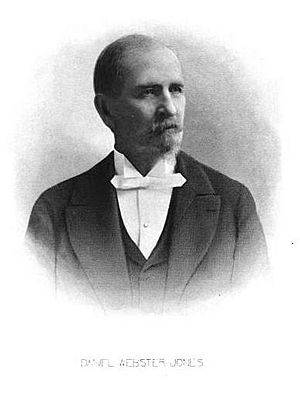Daniel Webster Jones (governor) facts for kids
Daniel Webster Jones (December 15, 1839 – December 25, 1918) was an important leader in Arkansas. He served as the 19th Governor of the U.S. state of Arkansas. He was also a lawyer and a soldier.
Quick facts for kids
Daniel Webster Jones
|
|
|---|---|
 |
|
| 19th Governor of Arkansas | |
| In office January 18, 1897 – January 18, 1901 |
|
| Lieutenant | Tim Griffin |
| Preceded by | James Paul Clarke |
| Succeeded by | Jeff Davis |
| Member of the Arkansas House of Representatives | |
| In office 1890 1914 |
|
| Personal details | |
| Born | December 15, 1839 Bowie County, Texas, U.S. |
| Died | December 25, 1918 (aged 79) |
| Political party | Democratic Party |
| Military service | |
| Allegiance | |
| Branch/service | |
| Rank | |
| Unit | |
| Battles/wars | Civil War |
Early Life and Education
Daniel Webster Jones was born in Bowie County, Texas. His father, Isaac N. Jones, was a doctor and a member of the government of the Republic of Texas. His mother was Elizabeth W. Littlejohn.
When Daniel was about one year old, his family moved to Washington, Arkansas. They owned a large farm in nearby Lafayette County, Arkansas. Daniel went to school at Washington Academy. Later, he studied to become a lawyer.
During his childhood, a famous blacksmith named James Black lived with the Jones family. James Black was known for creating the special Bowie knife. In 1870, Black tried to share his secret metalworking technique with Daniel. Daniel Webster Jones is the only person known to have learned this secret.
Military Service
When the American Civil War began, Daniel Webster Jones joined the Confederate States Army. He fought in battles and was wounded. He was also captured and held as a prisoner of war by the opposing side.
He rose to the rank of Colonel in the 20th Arkansas Infantry Regiment. This was a high leadership position in the army.
Political Career
After the war, Jones began his career in law and politics. In 1874, he was chosen as the prosecuting attorney for the Ninth Judicial District. This meant he was responsible for bringing legal cases against people accused of crimes.
He also served as a presidential elector in 1876 and 1880. A presidential elector is someone chosen to cast votes for president and vice president. In 1884 and 1886, he was elected as the Attorney General of Arkansas. This role made him the chief legal officer for the state.
In 1890, Daniel Webster Jones served a term in the Arkansas House of Representatives. This is part of the state's law-making body.
Governor of Arkansas
Jones was elected Governor of Arkansas in 1896. He was reelected for a second term in 1898. As governor, he helped make important changes for the state.
During his time as governor, money was set aside to build a new state capitol building. This is where the state government works. He also helped pass a law that made schools use the same textbooks. This helped make education more fair across the state.
After leaving the governor's office in 1901, Jones went back to working as a lawyer. He was elected to the Arkansas House of Representatives again in 1914.
Death
Daniel Webster Jones passed away on December 25, 1918, from pneumonia. He was buried at Oakland Cemetery in Little Rock, Arkansas. He was laid to rest in a Confederate States Army uniform with an American flag.
 | Anna J. Cooper |
 | Mary McLeod Bethune |
 | Lillie Mae Bradford |

